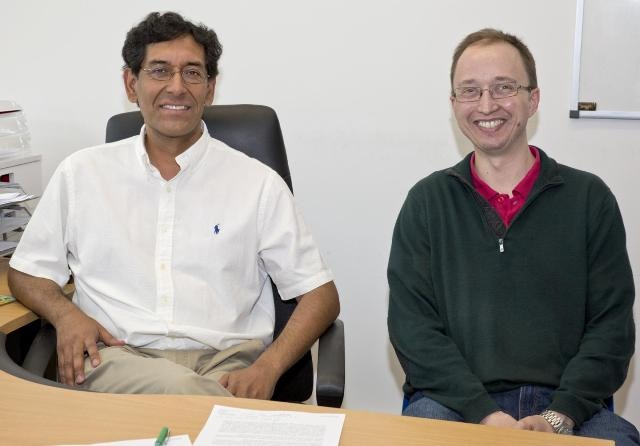Jun 10 2016
The QUTIS research group (www.qutisgroup.com) of the University of the Basque Country (UPV/EHU) and Google's quantum computation team have collaborated on a pioneering experiment that universally digitizes analogue quantum computation on a superconducting chip. This breakthrough was made at Google's labs in Santa Barbara (California) and has been published in the prestigious journal 'Nature'.
 Enrique Solano and Lucas Lamata. (CREDIT: UPV/EHU)
Enrique Solano and Lucas Lamata. (CREDIT: UPV/EHU)
The QUTIS group, led by the Ikerbasque professor Enrique Solano, is a world leader in theoretical proposals for quantum simulation and quantum computation with superconducting circuits and other quantum technologies, which are carried out and verified at major international scientific and technological labs. The American company Google has one of the most advanced labs in this field and is a world leader in this technology.
The UPV/EHU team that conducted this work was led by Prof. Enrique Solano and Dr. Lucas Lamata. And the Google team was led by Prof. John Martinis, Dr. Hartmut Neven, Dr. Rami Barends and Dr. Alireza Shabani.
Digital quantum computation splits up the problem to be resolved in terms of quantum logic gates in a way similar to that of a conventional computer. Analogue quantum computation, by contrast, consists of a continuous dynamics to get to the optimal solution of the problem. This dynamics can be slow, as is the case of adiabatic quantum computing based on so-called quantum annealing. What is more, superconducting quantum bits are devices that behave efficiently at very low temperatures that are achieved in advanced laboratories. In this pioneering experiment superconducting quantum bits were used to digitize an analogue quantum computer in a way similar to what is done with communication signals in conventional technologies. To do this, the problem was split up into a sequence of quantum logic gates, and quantum computation with the greatest complexity so far was achieved: over 1,000 logic gates operating on 9 quantum bits. This strategy will enable optimization problems to be universally solvable; they are useful in fields as general as finance, and also in the design of new materials and products for the pharmaceutical industry.
This breakthrough has come at a key moment for Europe as Brussels is expected shortly to be announcing the investment it will be making over the coming years in quantum technology research and development. Countries such as the United States, Japan, China, Australia and Canada are already investing huge economic resources in these areas with a global strategic framework. Among other things, quantum technologies will enable computer performance to be improved, progress to be made in machine learning and communication security to be reinforced.